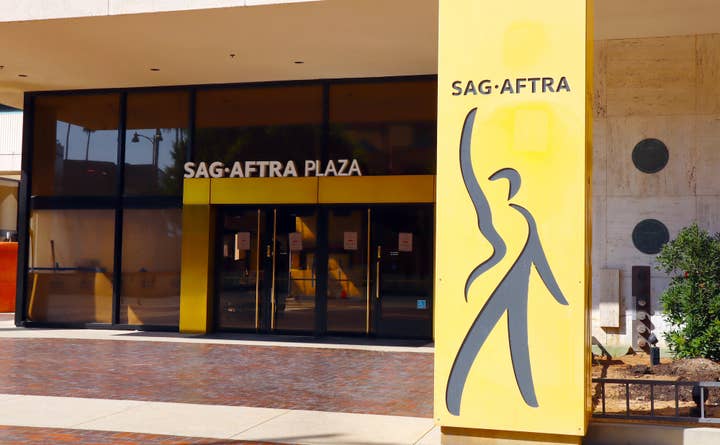It is now been eight months since SAG-AFTRA members voted in favour of a strike authorisation in the video games trade due to stalling negotiations over the Interactive Media Settlement.
The bargaining has been ongoing since October 2022 with corporations together with Activision, EA, Epic Video games, Insomniac, WB Video games, and extra – all corporations working with actors on voice and movement performances for video video games.
Whereas SAG-AFTRA has not moved ahead with its strike as of but, dialogue reached a little bit of a lifeless finish quickly after the authorisation was authorised, and the events have nonetheless not reached an settlement. Regardless of progress elsewhere – for example, with Reproduction Studios over moral use of AI voice work – negotiations over the Interactive Media Settlement really feel like they’re nearly at a standstill regardless of a number of rounds of bargaining.
“The road is drawn very clearly in the sand round AI as a problem,” says Sarah Elmaleh, voice actor (Anthem, The place the Water Tastes Like Wine), and chair of the Interactive Media Settlement negotiating committee at SAG-AFTRA. “We each introduced a variety of proposals to this package deal, and we resolved these over many months of bargaining, and issues have actually narrowed, centered, and scoped to the concern of AI, and whether or not the bargaining group is prepared to lengthen protections comprehensively to all members and performers inside SAG-AFTRA.”
SAG-AFTRA govt director and chief negotiator Duncan Crabtree-Eire tells us there’s been proposals backwards and forwards in the previous couple of months between the union and the corporations, particularly concerning AI.

“However sadly, as Sarah alluded to, the core concern hasn’t been resolved,” he continues. “And that core concern, when you actually boil it down to its essence, is that, as a union, our expectation and our demand is that each one of our members be protected with respect to AI. There are elementary protections that we count on to see in all of our collective bargaining agreements, with all of our employers, and that want to defend all of our members.”
Whereas the corporations have agreed to “many, if not all, of these protections,” Crabtree-Eire explains that some “have refused to lengthen them to all of [SAG-AFTRA] members who’re working beneath these contracts.”
“And as a union, we’re not leaving any of our members behind in the strategy of negotiating these sorts of protections. And albeit, these protections should not be that troublesome to agree to. They’re primary.”
He factors to the lengthy street SAG-AFTRA had to journey to attain related agreements with movie studios and streaming corporations final yr, with a five-month strike finally main to setting tips round AI use, amongst many different issues.
“Since that point, we have negotiated all these protections with the main report labels with out having to go on strike, we have negotiated them with the TV animation corporations with out having to go on strike, we have achieved them in different agreements like the Replica Studios agreement [around] video game voice replication, and we have embedded them in the new tiered Interactive Media Agreement. And since that point a variety of corporations have signed to these agreements.
“So it continues to mystify me why there may be such form of aggressive resistance to offering simply primary safety, respect, and luxury to folks in order that, once they go to work, they don’t seem to be placing themselves out of a job by enabling a firm to use them to compete with themselves for the subsequent job. It should not be so troublesome.”
When attempting to perceive why SAG-AFTRA is met with such resistance from sport studios, Crabtree-Eire says some may need a “philosophical mindset about AI.”
“They want to make a battle perhaps as a result of they’re scared about what the way forward for AI brings for their very own corporations they usually do not want to commit to one thing,” he says. “I perceive that, particularly in the generative AI space.
“It continues to mystify me why there may be such aggressive resistance to offering primary safety”Duncan Crabtree-Eire

“For instance, one in all the areas we have been challenged in bargaining over is the query of limitations on inputs for coaching knowledge and AI fashions. However that is not what we’re preventing over on this negotiation. So let’s be clear, we’re not speaking about their potential to stay aggressive with different AI corporations which can be exterior of this bargaining group, as a result of that is not what we’re speaking about. What’s at concern with this negotiation shouldn’t be inputs into coaching knowledge. What’s a problem on this negotiation is the concept that when a performer is engaged to work for these corporations, that there ought to be limits on the use of that work with out consent, with out truthful compensation, by the use of AI in subsequent tasks and issues like that.
“It is a very particular sort of safety that is distinctive to performers in a lot of the way and is fully according to what we have sought and achieved with these different large corporations – satirically a number of of that are owned by the identical mother and father as studios and streamers who’ve agreed to these very provisions in movie and tv work.”
Crabtree-Eire mentions that the ideas SAG-AFTRA has been preventing for have had a lot of public assist, together with “from individuals who usually don’t love unions in any respect,” he laughs.
He mentions the latest concern between Scarlett Johansson and OpenAI, with the company allegedly stealing the likeness of her voice for use in ChatGPT. Whereas the agency refuted the accusations, the actress revealed that she had repeatedly been approached by the firm to lend her voice to the chatbot, however declined. Crabtree-Eire factors to the proven fact that the actress had a right away outpouring of public assist, including: “I feel corporations are working a actual danger in the event that they underestimate how the public will react to them not treating staff pretty in the context of AI.”
Elmaleh emphasises that Johansson’s plight highlights a less-discussed danger that AI presents for performers.
“There’s this situation the place you go to work and are actively offering materials that might probably be used to exchange your self, which is terrifying. In order that situation should be accounted for, once more, for all performers, and a few partial protection has been gained to date there, however it’s a query of not leaving anybody behind.
“Nevertheless, the different potential [aspect] that wants to be accounted for, and that we now have in our proposals that has been repeatedly rebuffed, is round that situation the place, on this case they ask – it was actually much less of a proposal than a menace – Scarlett and be like, ‘Hello, we might like to rent you to do that’ and he or she stated no, after which [they] flip round and easily get one thing approximate out of a generative AI system, with out her ever having offered these supplies in the course of her work with them.
“And so the query of prompting a system and asking it to invoke a performer based mostly on a character that they are identified for, or based mostly on their identify itself in a approach that is actually recognisable and apparent inspiration, that situation additionally actually wants to be accounted for. And that one we’re nonetheless searching for actually important motion on.”
With AI safety for all SAG-AFTRA members being the major delay to the negotiations, we ask the pair whether or not a strike is getting increasingly more possible.
“There could also be a level quickly, if not the place we’re at now, the place these proposals are wanting related coming backwards and forwards, or the modifications or the progress is wanting slimmer and extra marginal, at which level you are questioning: are we transferring in direction of a deal or not?” Elmaleh says.
“The query of prompting a system and asking it to invoke a performer… actually wants to be accounted for”Sarah Elmaleh
“After which at that time additional strain wants to be utilized. The strain utilized by the strike authorisation yielded extra outcomes, and so we have been working with that, after which constructing different methods… However when productiveness sort of runs out in that course of, then additional strain wants to be utilized.”
Crabtree-Eire says he finds it arduous to see how SAG-AFTRA would compromise on safety for all its members, which is what might finally could lead on to a strike.
“What wants to occur to ensure that this to transfer ahead and us not to find yourself on strike in opposition to these corporations is for them to revisit their resistance and their insistence on form of splitting off our members and defending some and never others – that is how this finally will get resolved,” he says.
“So at this level, I might say there may be a actually actual chance that is trending in direction of likelihood that we are going to be on strike in opposition to them in the subsequent 30 to 45 to 60 days. We want to exhaust every alternative to attempt to resolve these items with out having to truly pull that trigger on a strike.”
Unionisation has traditionally been lagging behind in video games, with staff in the trade slowly catching up with protections which can be extra normal in movie. After we point out that actuality and ask what wants to change for video games to reap related advantages, Elmaleh says she’s to see what is going to come out of the present state of affairs.
“There may be a actual chance that is trending in direction of likelihood that we are going to be on strike in the subsequent 30 to 45 to 60 days”Duncan Crabtree-Eire
“The reality of any form of foundation of a union is that you’ve got to resist,” she says. “Companies do not give issues. Employers do not give issues with out resistance. To return into that consciousness as a employee that you’ve got one thing that they want, and that it’s leverage that may be utilized successfully – and has been confirmed to be utilized successfully by way of collective motion all through historical past – is an consciousness you want to step into and actually take possession of it. It takes a battle.
“However what precipitates a willingness to battle is the sort of state of affairs that we’re in now. The layoffs have been completely brutal. That sense that sustainability is not a precedence for a few of these people… that the people who find themselves at the moment deciding how issues are run might now not be appearing in your curiosity, or that it’ll take a sure diploma of frustration, disillusionment with the system that exists at the moment, and a willingness to construct a new system… Sadly for some folks, I feel it takes a actually darkish, troublesome second like this to be like, ‘ what? I am prepared to attempt to actually battle to make this look completely different for everybody’s profit’.”

Crabtree-Eire provides that a lot of employers have an outdated view of what it means to work with unions, and that it isn’t about disrupting enterprise operations.
“It is the opposite,” he says. “We want that to occur. We simply want it to occur beneath phrases which can be truthful, equitable, and respectful to the artistic expertise that is important to their success.”
One other outdated view is the concept that staff increase points as a result of they do not care about their work. Right here once more, it is the reverse.
“For anybody who’s nonetheless labouring beneath that: it isn’t true,” Elmaleh says. “It is simply that corporations might not have the mandate of particular person employee profession sustainability and longevity in thoughts. That is not a part of their purpose set. In case you love this work, you want to do it for a very long time, you want it to be sustainable, and it’s subsequently required, simply out of the forces of nature, for a counter power to advocate for that, and to actually stand agency with that perspective in thoughts… So I feel for folk who’re taking a look at this as a large nasty battle: it is actually nearly setting a boundary.”
“For people who’re taking a look at this as a large nasty battle: it is actually nearly setting a boundary”Sarah Elmaleh
Trying forward, each hope for an settlement to be reached, by way of a strike if wants be. Crabtree-Eire leaves us with a thought on what might lie past that settlement, particularly when occupied with the way forward for AI.
“We can all see that AI goes to proceed to evolve,” he factors out. “And that signifies that our contract, phrases, and provisions that relate to AI are additionally going to proceed to evolve.
“And in reality, with the tempo of evolution of AI, we have seen the evolution of our agreements truly occur shortly, even since final November, once we finalised the cope with the studios and streamers. As soon as this contract concern is resolved, my imaginative and prescient is that the corporations realise that the greatest approach for us to cope with that evolution is a continuous strategy of collaboration and dealing collectively to discover that path that’s acceptable, respectful, protecting, and human-centred, so far as AI evolution goes.
“And that, as difficult and as troublesome as this specific negotiation course of has been, that it would not have to be replicated going ahead as a result of we will see how there may be a path into the future the place we work collectively.”
